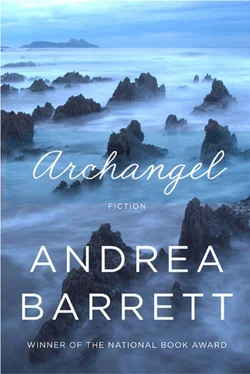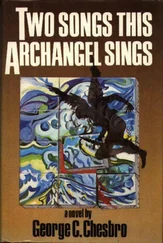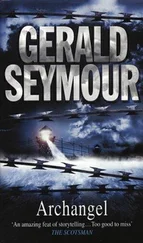From Lodge’s longing for his son had come, Sam argued, an entire theory of etheric transmission, which, if it wasn’t true — he himself believed it was not — was still a marvelous example of how science was influenced by feeling. About the connection between that feeling and the construction and testing of any scientific hypothesis. Lodge had suggested in his lecture that Einstein’s theory had been tested but not completely proven by the eclipse experiments. His book suggested that his experiments after Raymond’s death offered a similar level of proof for the theory of survival of personality. Phoebe slowed down and read each word.
My father died when I was four; I miss him all the time. For years I was sure he was up in the air somewhere, among the stars he studied. I listened for him every night; I thought that from someplace deep in space he would try to contact me. When we moved from the house where I was born, I was terrified that if he sent a message it wouldn’t reach me. Later, I convinced myself that he could find me anywhere, at any distance, and that the fault was mine; if I couldn’t hear him, it was because I didn’t know how to listen. If I stretched myself, broadened myself, I’d be like a telescope turned onto a patch of sky that before had seemed blank; suddenly stars would be visible, nothingness would turn into knowledge. Across time and space, my father would reach out to me .
Here was Michael at last: she could see his face as clearly as when they’d first kissed on the riverbank, under the starry sky.
Eventually, I had to give up on this idea, but as I listened to Lodge’s lecture I fell back into it, and for a few moments, I wanted so badly to believe him that I did. I understood the ether of space to be exactly as Lodge described it, a universal medium that transmits not only electromagnetic forces but also the thoughts and longings of the dead. Only when I looked around at the audience and saw them all believing the same thing did I realize what was happening .
I don’t understand the physics behind Einstein’s theory, and I don’t believe in the existence of a spirit world, but my introduction to Lodge’s work changed the way I think. I don’t know, and I don’t believe there is sufficient evidence yet to prove, whether the ether is real the way the atmosphere is real, or the way the equator is real. Whether Einstein’s theory has been proven, or Lodge’s theory of survival of the personality after death, or neither or both. I don’t know whether my father exists in some ethereal form or only in my heart. What I do know is that the questions we ask about the world and the experiments we design to answer them are connected to our feelings .
Where had Sam learned to write like that? Upstairs, her father’s viola sang, dismantling troubles Phoebe knew nothing about. Across from her, Sam and her mother nestled back in their chairs, each reading with such concentration that when she finished Sam’s essay, neither noticed for a moment. Then her mother looked up.
“It’s good,” she said. “Isn’t it?”
“Lovely,” Phoebe agreed. Her mother had already read it. Down the stairs, through the empty rooms, triplets rippled in sets of four: the prelude to the sixth Bach cello suite, transcribed for viola, which her father had been playing while she and Sam and her mother read, each of them deep in their own thoughts but sharing a room, the light from the lamps, the sense of piecing together a sequence of thoughts. Then — not a rift, but a discontinuity. How does a person end up like this? For much of her life she’d been listening, sometimes consciously, sometimes not, to her father play those suites. Until just that moment, with the triplets running steadily up and down, she would have told herself that the space between her and family wasn’t empty at all but held light and music, feelings and thoughts, and a bond that could be stretched without breaking.
The train trip took the whole day. Oswego to Albany and then the length of Massachusetts, orchards and mountains and rivers and fields, cities appearing then disappearing while the sky darkened steadily until, near Boston and the coast, the rain began. By nine o’clock, when Henrietta Atkins stepped down at New Bedford, it was pouring. Her skirt was spotted with mud before she was halfway down the block; her hair dripped over her shoulders; the two bags packed with notebooks, drawing pencils, boots, clothes, and the tiny stipend meant to cover her expenses for the next seven weeks sagged alarmingly.
This was on a Friday night in July of 1873, the low clouds trapping a smell — weedy, salty, slightly medicinal — that Henrietta, who had never been near the shore, thought might be the sea. She headed away from the station, searching for the hotel that the organizers of the natural history course had recommended to those coming from far away. Excelsior? Excalibur? She’d lost the letter with the details — but there at the end of the block was a gray building, four stories tall, marked with a giant E . She climbed the steps, set down her bags, and pushed back some wet strands of hair. Inside, she imagined, might be other students signed up for the course: girls who, like her, had just graduated from Normal School and were about to start teaching, older women who’d worked at academies for a while, men who taught at colleges and might give her advice. A shame to meet her new companions so bedraggled.
The hall was empty, but she followed the sound of voices into a sitting room, where two men stood before a fire. One, talking intently, was stout and young and cradled his round stomach with one hand. The other she recognized as the famous professor. In person he looked older, and less robust, than the portraits in the newspapers. When he caught her staring, she set down her bags again.
“If you have books in there,” he said, interrupting his companion to gesture her way, “I hope you wrapped them in oilcloth.”
“Of course,” she said, mortified. She’d imagined meeting him in a classroom, where she could hide among a mass of other students. In a classroom, not here. At Oswego she’d studied his zoology textbook and read his work on glacial action, while long before that her mother, in response to a public plea for specimens, had proudly contributed to his study by sending him fish from Keuka Lake. His letter of thanks, matted and framed — a form letter but, as her mother always pointed out, personally addressed and signed — still adorned their dining room wall.
She offered her name, adding, “I’m one of your students, I think. I’m so looking forward to starting your course tomorrow.”
“Tuesday!” the professor said genially. “We don’t start until Tuesday.”
“If then,” the younger man added. “The buildings are barely halfway done and I don’t see how we can finish in time. You may have to delay the course.” He flicked at the newspaper lying on the table. “There’s an article in here about it, so embarrassing …”
“We will start Tuesday!” the professor repeated. “We absolutely must .” He turned back to Henrietta. “But why did you come so early?”
She’d confused the dates, Henrietta learned then. Mocking, by her own stupidity, the award her teachers had given her at graduation, which would pay for this course; mocking her proud mother’s twenty-first birthday gift of boots and a specimen box. For all her bee-like bustle, her endless lists and meticulous packing, she’d been so sure the course started on a Saturday that she’d failed to double-check the actual date. As she began to panic about her stipend, which wouldn’t cover the extra nights in the hotel, not the extra meals or even an extra bar of soap, a woman in a green dress rose from an armchair across the room and called her over.
Читать дальше












